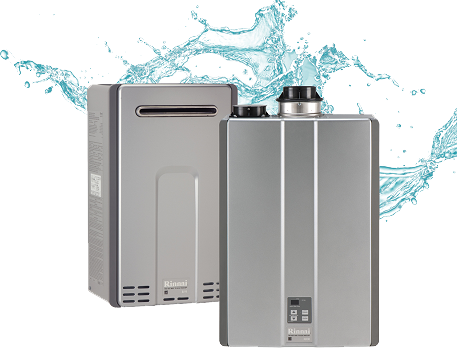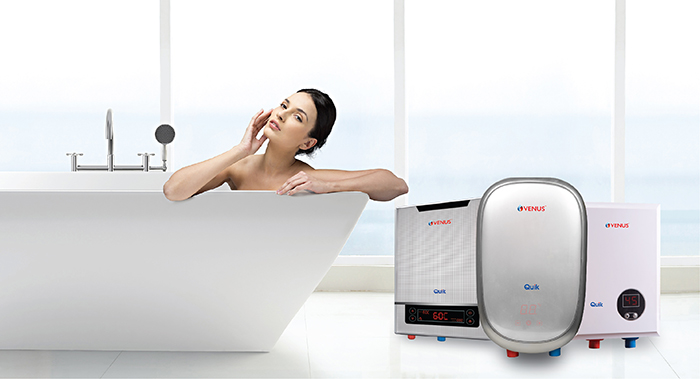The Guide To The Gains Of Continuous-Flow Water Heaters
The Guide To The Gains Of Continuous-Flow Water Heaters
Blog Article
Are you in search of information and facts concerning Pros and Cons of Tankless Water Heater?

In a globe where convenience and performance reign supreme, it's no surprise that house owners are constantly looking for smarter ways to handle their home's energy intake and convenience. One advancement that has steadily obtained appeal is the tankless hot water heater. However what exactly makes these systems stand out from the traditional tank-based models a lot of us matured with? Let's dive in and check out the advantages of tankless hot water heater, helping you make a decision if it's time to make the button in your house.
Introduction
Photo this: you enter the shower after a long day, anticipating a soothing cascade of hot water, just to be greeted by icy beads due to the fact that the last individual used everything up. Sound acquainted? Conventional water heaters keep a set quantity of hot water, implying you go to the mercy of that tank's supply. Tankless systems, on the other hand, heat water as needed. Say goodbye to running out mid-shower, no more wrestling with routines just to make certain warm water is readily available.
Comprehending Tankless Water Heaters
What Are Tankless Hot Water Heater?
Tankless hot water heater, sometimes referred to as on-demand or instant hot water heater, offer hot water just as it's required. As opposed to keeping gallons of pre-heated water, these systems kick right into action the minute you turn on the tap. Water passes through a warmth exchanger, heating up in real-time, meaning you get a nonstop circulation of warm water without the need for a huge storage tank resting idly by.
How Do They Vary from Conventional Systems?
Standard heaters hold a storage tank of hot water, making use of energy to maintain that tank at a constant temperature. Tankless devices eliminate the standing supply, cutting down on thrown away energy and the cumbersome footprint of a big cylinder. Essentially, you're updating from a "stockpile" attitude to a "made-to-order" strategy.
Common Types of Tankless Systems
Tankless water heaters generally can be found in two selections: gas and electric. Gas designs tend to supply greater flow prices, perfect for bigger families, while electrical models usually serve smaller homes and are usually simpler to install. Furthermore, some systems are developed for point-of-use (offering one fixture) while others can handle the whole home's hot water needs.
Secret Advantages of Tankless Water Heaters
1. Endless Warm Water Supply
Ever before needed to arrange showers so everybody gets their reasonable share of warm water? With tankless, that ends up being a distant memory. As long as the heating system's flow capacity isn't exceeded, you can take back-to-back showers without becoming a popsicle.
2. Power Efficiency and Price Financial Savings
No more warming a titan storage tank's well worth of water and maintaining it toasty throughout the day. Tankless heaters reduce standby energy losses, which can reduce energy expenses. While the first price might be higher, the long-term financial savings frequently validate the investment.
3. Space-Saving Style
If your home is short on storage, eliminating the cumbersome container liberates important space. Tankless systems are portable and can typically be installed on walls, stashed in edges, or set up in limited energy wardrobes without monopolizing the entire space.
4. Longer Lifespan
A properly maintained tankless hot water heater can outlast its tank-based cousin. Typical storage tanks might last 10-15 years, while tankless designs can maintain downing along for two decades or more, making them a solid financial investment gradually.
5. Improved Water Quality
Saving water in a storage tank can often result in sediment build-up or a somewhat "off" preference. With tankless systems, fresh water is heated up instantly, minimizing the possibilities of sediment build-up and potentially supplying cleaner-tasting water.
Factors to consider Before Switching
Though the benefits are compelling, it's wise to think about a few factors before totally committing.
Preliminary Investment Costs
Tankless heating systems normally feature a greater ahead of time cost. Between the system itself and prospective installation modifications, the initial price could provide you sticker label shock. Yet keep in mind to watch it as a long-lasting investment.
Setup Demands
Depending on your home's facilities, you could need added electrical capacity or gas line upgrades. Guarantee you understand the setup needs and speak with a specialist to avoid surprises.
Reviewing Your Home's Water Use Patterns
If your household at the same time utilizes several fixtures with high hot water demand, ensure the device's flow price fulfills your demands. Recognizing your usage patterns helps you select the appropriate dimension and kind of tankless heater.
Maintenance and Care Tips
Tankless systems are fairly low upkeep, however they aren't set-it-and-forget-it appliances.
Routine Cleaning and Descaling
Tough water minerals can develop in the heat exchanger, affecting effectiveness. Routine descaling (frequently advised yearly) keeps the unit going for peak performance.
Annual Expert Evaluations
A yearly checkup from an expert makes sure small problems are captured early. They'll evaluate the device's efficiency, search for leakages, and aid maintain optimal effectiveness.
Making Sure Correct Ventilation
For gas models, proper ventilation is important to safely remove exhaust gases. Ensure venting systems are clean and properly set up to stop any prospective safety and security dangers.
Contrasting Different Brands and Models
Not all tankless hot water heater are created equal.
Looking Into Reliable Suppliers
Try to find trusted brands with a history of generating high quality systems. A trustworthy producer frequently gives much better customer support and longer warranties.
Checking Out Reviews and User Comments
Customer reviews and comments from neighbors or good friends who have gone tankless can use valuable understandings. In some cases, real-life experiences can be a lot more informing than marketing brochures.
Setup: DIY or Expert?
While some property owners enjoy dealing with tasks themselves, tankless installment might not be the best time to break out the toolbox.
Pros and Cons of DIY Installment
A DIY set up might conserve cash, yet it features threats. Incorrect installation can lead to ineffectiveness or safety issues. If you come in handy and have experience, it may be practical-- however wage care.
When to Call a Specialist Plumber
For a lot of, calling a pro makes sure whatever's done appropriately. An expert plumbing technician understands regional codes, sizing needs, and venting specifications, lowering the risk of mishaps.
Making the most of Performance
You've purchased a tankless system-- currently maximize its efficiency.
Optimum Temperature Level Settings
The majority of people establish their systems between 120-140 F. Readjusting the temperature level can boost convenience and cost savings. Experiment to discover a sweet area that doesn't squander energy.
Coupling With Low-Flow Fixtures
Wish to stretch your system's capabilities? Consider mounting low-flow showerheads and faucets. They reduce water use, permitting your tankless system to provide a consistent stream of hot water without stressing.
Environmental Influence
Tankless hot water heater straighten with greener living goals.
Minimized Carbon Footprint
By using much less energy and only heating water as needed, tankless systems can decrease your home's carbon impact, minimizing your ecological effect.
Saving Natural Resources
Less power intake and much less lost warm water translate into fewer natural deposits being used, an ecological win-win.
That Benefits The Majority Of from Tankless Heating units?
The charm of tankless heating units is that they can match a range of homes.
Huge Households vs. Single Passengers
Large families may love the endless hot water supply, while solitary occupants value the power cost savings from not warming an entire storage tank for simply a single person's early morning shower.
Homeowners with Minimal Area
If your home is short on square video, shedding the cumbersome container liberates room for other essentials-- or maybe just much more elbow room.
Eco-Conscious Consumers
Going tankless aligns with eco-friendly worths, guaranteeing you're not throwing away energy or resources.
Future Fads in Tankless Water Heaters
The globe of home devices is ever-evolving, and tankless water heaters are no exception.
Smart Home Integration
Envision readjusting your hot water heater's temperature through an app or obtaining upkeep signals on your phone. As wise home technology developments, we'll see more connection and ease.
Innovations in Technology
R&D is frequently enhancing warmth exchangers, making units a lot more reliable and long lasting. Future designs may be also quieter, a lot more portable, and far better matched for varying environments.
Final thought
Picking a tankless water heater is more than simply updating your home's hot water system; it's purchasing long-term comfort, energy performance, and a greener way of living. By considering your house's water use, bearing in mind installation requirements, and committing to normal upkeep, you can enjoy a stable stream of warm water without the luggage of a large container. As innovation progresses, you can look forward to also smarter, extra reliable tankless remedies that not only make your life less complicated yet likewise profit the earth.
Why You Should Consider a Tankless Water Heater for Your Home
Energy Efficiency and Cost Savings
Tankless water heaters, also known as on-demand water heaters, heat water only when needed. This means they don't waste energy keeping a tank of water hot constantly. This efficiency translates into substantial cost savings on your monthly energy bills.
Endless Hot Water Supply
One of the significant advantages of tankless water heaters is their ability to provide a continuous supply of hot water. Traditional tank water heaters have a limited capacity and can run out of hot water, especially during peak usage times. In contrast, tankless water heaters can provide an endless stream of hot water, making them ideal for larger families or homes with high water usage.
Space-Saving Design
Tankless water heaters are compact and take up significantly less space compared to traditional tank heaters. They can be installed on walls, under cabinets, or even outside, freeing up valuable space in your home. This makes tankless water heaters a great option for smaller homes or properties with limited space for a traditional water heater.
Longer Lifespan and Lower Maintenance
Tankless water heaters typically have a longer lifespan compared to traditional tank heaters. They can last up to 20 years or more with proper maintenance. Additionally, tankless systems are designed with replaceable parts, which can extend their lifespan further and reduce long-term maintenance costs.
Environmentally Friendly
Reducing energy consumption not only saves you money but also benefits the environment. Tankless water heaters contribute to a smaller carbon footprint by using less energy to heat water. Their energy efficiency and ability to minimize standby heat loss make them an eco-friendly choice for environmentally conscious homeowners.
Customized Temperature Control
Tankless water heaters offer precise temperature control, allowing you to set the desired temperature to meet your specific needs. This level of customization ensures you always have water at the perfect temperature for your comfort and usage requirements.
https://beantownservices.com/blog/consider-tankless-water-heater-for-your-home

We had been guided to that editorial about Unveiling the Hot Trend: The Benefits of Tankless Water through someone on our other web page. Sharing is good. You never know, you may be doing someone a favor. Many thanks for being here. Come back soon.
Call Today Report this page